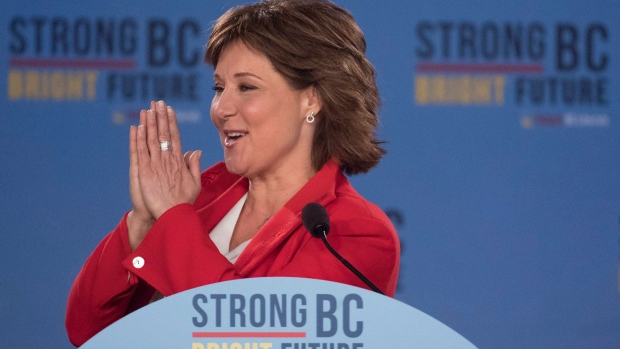May 10, 2017
What a minority government means for B.C.'s energy sector

ANALYSIS: Blame the results of the British Columbia election for the impending death of the province's energy sector.
B.C. Premier Christy Clark declared the narrowest of victories overnight, with her Liberal Party projected to win 43 of the provincial legislature’s 87 seats compared to 41 seats for the BC NDP and three going to the BC Green Party. Assuming those results are confirmed – which remains far from certain as recounts in several close ridings could alter the final seat count – Clark will lead the first minority government B.C. has seen since 1952.
In that scenario, Clark will be premier in name only, with the real balance of power in the hands of BC Green Party leader Andrew Weaver. If Clark hopes to cobble together B.C.’s first coalition government in 65 years, she will have to curry the favour of a man with a doctorate in climate sciences whose aversion to oil and gas expansion is akin to Superman’s aversion to Kryptonite.
Exporting liquefied natural gas (LNG) has long been expected to provide a future boost for the B.C. economy. The centerpiece of Clark’s last successful re-election campaign back in 2013 was a plan to create 100,000 new LNG-related jobs generating $100 billion in additional government revenue over the next decade. There has long been major skepticism about whether such an ambitious plan was ever realistic, especially as multibillion-dollar proposals that were previously seen as the most likely to proceed have been delayed, in some cases indefinitely.
Whatever hope remained for the nascent LNG sector in B.C. Tuesday night will almost assuredly end if Weaver maintains his fortuitous position as the ultimate provincial power broker.
“I think talk of B.C. becoming a major LNG exporter is nothing more than a pipe dream,” Weaver told the Victoria Times-Colonist in 2013, shortly after being elected as the first Green Party member to win a seat in the B.C. legislature.
He has opposed every major piece of legislation related to fossil fuel development – even going as far as calling a 2014 law established to govern emissions from the LNG industry as a “shameful betrayal of future generations.”
Then there is the controversial approval of Kinder Morgan’s plan to triple the capacity of its half-century-old Trans Mountain pipeline. When the project received federal government approval last November, Weaver released a statement accusing Prime Minister Justin Trudeau of having “betrayed the trust of British Columbians,” adding his party believes “heavy oil tankers have no place on our coast.”
When Premier Clark also signed off on Trans Mountain in early 2017 – in exchange for $1 billion from Texas-based Kinder Morgan over the next 20 years – Weaver gave several interviews maintaining his position that the project represents a “massive threat” to the B.C. environment and should not be allowed to proceed.
Beyond his opposition to LNG and individual energy infrastructure projects, his party also has a much more ambitious goal of reforming the way B.C. regulates its oil and gas sector in general.
“The B.C. Oil and Gas Commission is both the champion of the oil and gas industry, and the regulator charged with ensuring compliance with environmental legislation,” reads an excerpt from the B.C. Green Party campaign platform page on natural resources.
“In the current ‘get to yes’ climate, the emphasis is on promoting oil and gas extraction rather than ensuring environmental compliance,” the page says, before going on to explain how the BC Greens support shifting that emphasis from the former to the later.
With the three votes under Weaver’s control likely to decide whether Clark’s minority government can survive a single legislative sitting, more of his positions are set to become official British Columbia government policy than B.C. residents might expect.



